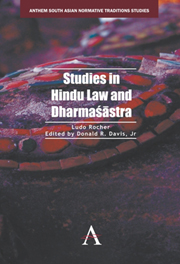Book contents
- Frontmatter
- Contents
- Foreword by Richard W. Lariviere
- Preface
- Abbreviations
- Note on the Edition
- Introduction
- PART ONE THE NATURE OF HINDU LAW
- PART TWO GENERAL TOPICS OF HINDU LAW
- PART THREE HINDU LEGAL PROCEDURE
- PART FOUR TECHNICAL STUDIES OF HINDU LAW
- Possession Held for Three Generations by Persons Related to the Owner
- The Vīramitrodaya on the Right of Private Defence
- The Technical Term Anubandha in Sanskrit Legal Literature
- The Kāmasūtra: Vātsyāyana's Attitude toward Dharma and Dharmaśāstra
- In Defense of Jīmūtavāhana
- Dāsadāsī
- The Definition of Vākparuṣya
- Janmasvatvavāda and Uparamasvatvavāda: The First Chapters on Inheritance in the Mitākṣarā and Dāyabhāga
- Karma and Rebirth in the Dharmaśāstras
- Notes on the Technical Term Sāhasa: “Fine, Pecuniary Penalty”
- Avyāvahārika Debts and Kautilya 3.1.1–11
- The Sūtras and Śāstras on the Eight Types of Marriage
- Caritraṃ Pustakaraṇe
- The Terms Niyukta, Aniyukta, and Niyoga in Sanskrit Legal Literature
- The Aurasa Son
- The Introduction of the Gautamadharmasūtra
- PART FIVE ANGLO-HINDU AND CUSTOMARY LAW
- Bibliography
- Index
Avyāvahārika Debts and Kautilya 3.1.1–11
from PART FOUR - TECHNICAL STUDIES OF HINDU LAW
Published online by Cambridge University Press: 05 February 2013
- Frontmatter
- Contents
- Foreword by Richard W. Lariviere
- Preface
- Abbreviations
- Note on the Edition
- Introduction
- PART ONE THE NATURE OF HINDU LAW
- PART TWO GENERAL TOPICS OF HINDU LAW
- PART THREE HINDU LEGAL PROCEDURE
- PART FOUR TECHNICAL STUDIES OF HINDU LAW
- Possession Held for Three Generations by Persons Related to the Owner
- The Vīramitrodaya on the Right of Private Defence
- The Technical Term Anubandha in Sanskrit Legal Literature
- The Kāmasūtra: Vātsyāyana's Attitude toward Dharma and Dharmaśāstra
- In Defense of Jīmūtavāhana
- Dāsadāsī
- The Definition of Vākparuṣya
- Janmasvatvavāda and Uparamasvatvavāda: The First Chapters on Inheritance in the Mitākṣarā and Dāyabhāga
- Karma and Rebirth in the Dharmaśāstras
- Notes on the Technical Term Sāhasa: “Fine, Pecuniary Penalty”
- Avyāvahārika Debts and Kautilya 3.1.1–11
- The Sūtras and Śāstras on the Eight Types of Marriage
- Caritraṃ Pustakaraṇe
- The Terms Niyukta, Aniyukta, and Niyoga in Sanskrit Legal Literature
- The Aurasa Son
- The Introduction of the Gautamadharmasūtra
- PART FIVE ANGLO-HINDU AND CUSTOMARY LAW
- Bibliography
- Index
Summary
The beginning of Kauṭilīyārthaśāstra 3.1 can be summarized as follows:
3.1.1 dharmasthās… vyāvahārikān arthān kuryuḥ.
3.1.2 pratiṣedhayeyur vyavahārān
(a) tirohitān [see Appendix]
3.1.6 …tirohitāḥ sidhyeyuḥ;
(b) antaragārakṛtān
3.1.7 …antaragārakṛtāḥ sidhyeyuḥ;
(c) naktakṛtān
3.1.8 …rātrikṛtāḥ sidhyeyuḥ;
(d) araṇyakṛtān
3.1.9 …araṇyakṛtāḥ sidhyeyuḥ;
(e) upadhikṛtān
3.1.10 …upadhikṛtāḥ sidhyeyuḥ;
(f) upahvarakṛtān
3.1.11 …upahvarakṛtāḥ sidhyeyuḥ.
The main sections of this passage have been translated by Shamasastry:
…three members acquainted with the Sacred Law…shall carry on the administration of justice. They shall hold as void agreements entered into…;
by Meyer:
Drei Richter…sollen die bürgerlichen Gerichtssachen…entscheiden… abgeschlossene bürgerliche Handlugen sollen sie verbieten;
and by Kangle:
Three judges…shall try cases arising out of transactions. They should declare as invalid transactions concluded….
AŚ 3.1.2 obviously provides a list of exceptions to 3.1.1. If 3.1.1
formulates the general rule for vyāvahārikān arthān, we may, then, conclude that 3.1.2: tirohita∘… ∘upahvarakṛtān vyavahārān, refers to avyāvahārikān arthān.
To be sure, the term avyāvahārika does not occur in classical Sanskrit legal literature; but is has been used extensively in modern Hindu law of debts. The basis of the entire theory of avyāvahārika debts is a stanza attributed either to Vyāsa or Uśanas (DhK 1.714):
daṇḑo (∘aṃ) vā
daṇḑaśeṣo (∘aṃ) vā
śulkaṃ tac cheṣa (∘aṃ) eva vā
na dātavyaṃ tu putreṇa
yac ca na vyāvhārikam.
Kane rightly points out: “What is meant by ‘debts that are not vyāvahārika’ has presented the greatest difficulty to the medieval commentators and digests and also to modern courts” (1930–1962: 3.447). Colebrooke was the first one to propose a translation for avyāvahārika debts: “any debt for a cause repugnant to good morals” (Colebrooke 1798 1: 211).
- Type
- Chapter
- Information
- Studies in Hindu Law and Dharmasastra , pp. 581 - 586Publisher: Anthem PressPrint publication year: 2012



